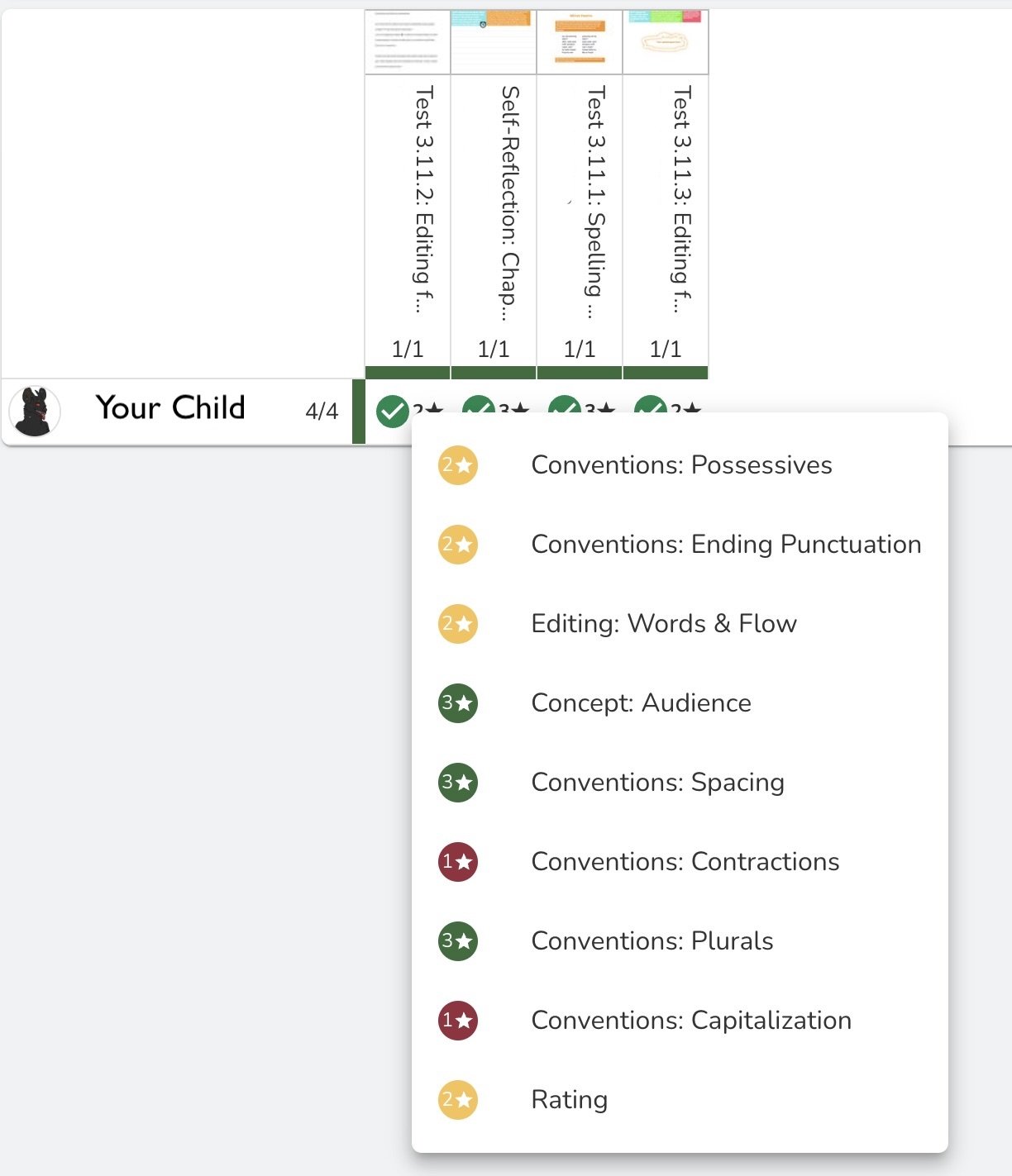The June Writers Academy Blog
Your guide to supporting your child’s development as a writer and thinker.
Launch News: Level 4 will begin rolling out June 2, 2023
We’ve been hard at work producing Level 4: Grammar & Punctuation for Life, which teaches kids all about grammar and advanced punctuation. Check out our recent blog post about why and how we teach grammar here. If you’ve been itching to get your kid to finally (yes, a split infinitive) tighten up the mechanics of their writing—no more misplaced commas and complicated subjunctive clauses, etc.—this is the summer to realize your goal.
The (unusual) case for teaching grammar
We’ve begun production of Level 4: Grammar & Punctuation for Life, which teaches kids how to understand and use grammatical concepts and advanced punctuation. Levels one through three also cover foundational grammatical and punctuation concepts and skills, and we give mechanical feedback to kids on most practices. So, Level 4: Grammar & Punctuation for Life is not an island of mechanical learning in our program, but Level 4 will be where we help kids wrap their heads around what grammar means in the context of the rest of their life, why it’s useful to know, and how to use it with ease.
The layers of an argument
We’ve written before about the importance of teaching kids to write multi-layered arguments early in their development process. Writing three-layered arguments is the key work of our Level 2: Arguments in Microcosm program, but most kids and adults don’t immediately understand what this means—or looks like. So, here is a breakdown of what the different layers look like when it comes to kid writing.
News: Level 3 is now live!
Level 3: Texts Under Scrutiny is now live!
If your child struggles with or is ready to take on analytical reading and writing about challenging non-fiction texts, Level 3 is their rocket to success. Your child will learn:
Parent Tips: Practice 3.4.2
In Lesson 3.4.2, your child will be presented with an unfamiliar text and asked to use their new Level 2: Inspectional Reading and Level 3: Analytical Reading skills to parse it. We’ve chosen three texts from the real world, including excerpts from the UN Convention on the Rights of Children, a piece of legislation from the U.S. Congress, and a letter from someone famous. These first two texts will be in formats unfamiliar to most kids and may feel overwhelming to some kids.
Parent Tips: Lesson 3.4
In Lesson 3.4, we introduce the concept of higher-level reading and teach your child how to do Level 2: Inspectional Reading and the beginning parts of Level 3: Analytical Reading.
News: Two big user experience improvements launching March 20th!
On March 20th, we will launch both Level 3: Texts Under Scrutiny and two big user experience improvements to our central content hub. Our goal with this new launch is to make it easier for you to get exactly what you need for your child(ren) from the June Writers curriculum. Here’s what to expect.
Launch News: Level 3 Available March 20th
We’re excited to announce that Level 3: Texts Under Scrutiny will be available beginning March 20, 2023.
If your child struggles with or is ready to take on analytical reading and writing about challenging non-fiction texts, Level 3 is their rocket to success. Your child will learn:
A Parent’s Guide to AI:
It’s hard to open the news these days without hearing about ChatGPT and other AI tools, so we wanted to understand an expert’s take on what critical thinking and technical skills are vital for our children to learn and remain in control of in their work versus where AI can legitimately be helpful–plus, should cats be concerned about AI?
Outline or bubble map? Which is better?
Adults can have strong feelings about the best way to teach kids to write. A surprising number of us wax poetic for hours about the joy of sentence diagramming, while an equal number are driven to drink by the memory. Some adults believe outlines are the only way to organize thoughts in the pre-writing stage, but others are fine with outlining or bubble maps. (And a shocking number don’t make a habit of organizing their thoughts before they write.) So, what is the best way to teach kids to write?
Level 2: Arguments In Microcosm is live!
Level 2: Lists & Paragraphs is now live on junewriters.com!
New user features! Say hello to the central content hub.
Over the last few months, we’ve been hard at work producing our Level 2 content. As part of that process, we’ve used your feedback to develop a new set of user experience improvements that reflect how our existing families—children and parents—want to be able to navigate our content.
Gift cards now available!
This holiday season, give the gift of writing to the amazing children in your life.
Launch News: Level 2 Available January 2, 2023!
If your child is bringing home paragraphs that are unexamined facts strung together with phrases such as “first,” “in conclusion,” or “in my opinion,” or routinely writes texts that are riddled with mechanical errors, then Chapter 2 is for you!
Parent Tips: Practice 2.8.2
Some kids will be able to dive right into writing paragraphs by Lesson 2.8. (Note that we will have asked your child to spend extra time on extension practices for Lesson 2.4 if we thought they needed more practice on paragraph writing basics before they moved on to Lesson 2.5+.) Others will need to use part or all of the scaffolding sequence we taught in Lesson 2.3, Lesson 2.4, and Lesson 2.7 to complete Lesson 2.8. That’s OK!
Parent Tips: Lesson 2.1
Lesson 2.8 is about writing paragraph content in chronological order, but it’s also about teaching kids to think about the best ways to organize their thoughts.
Questions to ask on school tours about humanities curriculum
It’s school tour season! Millions of parents are peering through halls, cafeterias, and classrooms trying to decide whether a given school is a good fit for their child(ren)—including people on the June Writers team. Most of these parents know how to suss out whether their kid(s) will be welcome and safe at school.
June Writers is now open!
We’re thrilled to announce that June Writers Academy is now live!
Mid-October is usually the time of year when parents begin to notice if their hopes for their child’s development in school are not matching reality.
Why play with words?
Sure, playing around with words is fun. That’s about 50% of why we made our Play With Words videos, which are perfect for young kids who are learning to read and write. But that’s not the only reason. Playing with words is also a wonderful way to pass time on a bus or train ride with a kid (particularly if you’re tired of, for example, discussing Paw Patrol), help children develop stronger phonemic awareness, and make words relevant and useful to their lives.
Assessment
At the end of each chapter of the June Writers program, we ask your child to complete three tests and one self-reflection exercise. The purpose of these tests is to check whether your child has mastered the concepts and skills in the chapter, give you and your child feedback on the current strengths and weaknesses of their writing, and figure out the best next steps in their development as writers and thinkers.


















